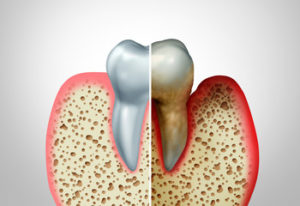Gum Disease Plano Texas

Gum disease is a term people use for a few different conditions. The main two are gingivitis and periodontitis. Gingivitis is an inflammation of the gum tissues and is reversible. Periodontitis is the loss of the gum and bone tissues that hold your teeth in. This is not reversible but can be stopped with proper treatment and home care.
There are some genetic components that increase the risk of periodontal disease, but the main risk is inadequate home care and lack of professional cleanings. Once the bacterial deposits on your teeth harden into calculus or “tartar,” they cannot be removed at home. Those deposits are the first step in the process of periodontitis. Not removing these bacteria and letting them continue to grow is the underlying cause of gum disease.
TREATING GUM DISEASE
Gingivitis can be easily treated and reversed by an in-office cleaning at our Plano dental office and improved brushing and flossing at home.
Periodontitis cannot be reversed but it can be treated. The goal of treatment is to prevent further loss of the bone that holds your teeth in. This is done with scaling and root planing. People often call this a “deep cleaning” but it is more than that. It involves removing all the hard and soft deposits of bacteria from above and below the gums. We then have you use a medicated mouthwash for a few weeks afterward to reduce the bacteria that cause periodontitis. The most important part of controlling periodontitis is regular maintenance. The bacteria that cause the loss of bone are aggressive. Your teeth will need to be cleaned at Bellingham Family Dental every three to four months or the bone loss can start up again. Once that bone is gone, it is gone forever.
GUM DISEASE PREVENTION
Gingivitis can be prevented with regular, effective brushing and flossing. Unfortunately, no one can remove 100% of plaque from their teeth and those bits left over will harden into tartar over time, potentially leading to periodontitis. These deposits can only be removed with proper dental instruments. This is why regular visits to see the Dr. can help prevent gingivitis and periodontitis.
